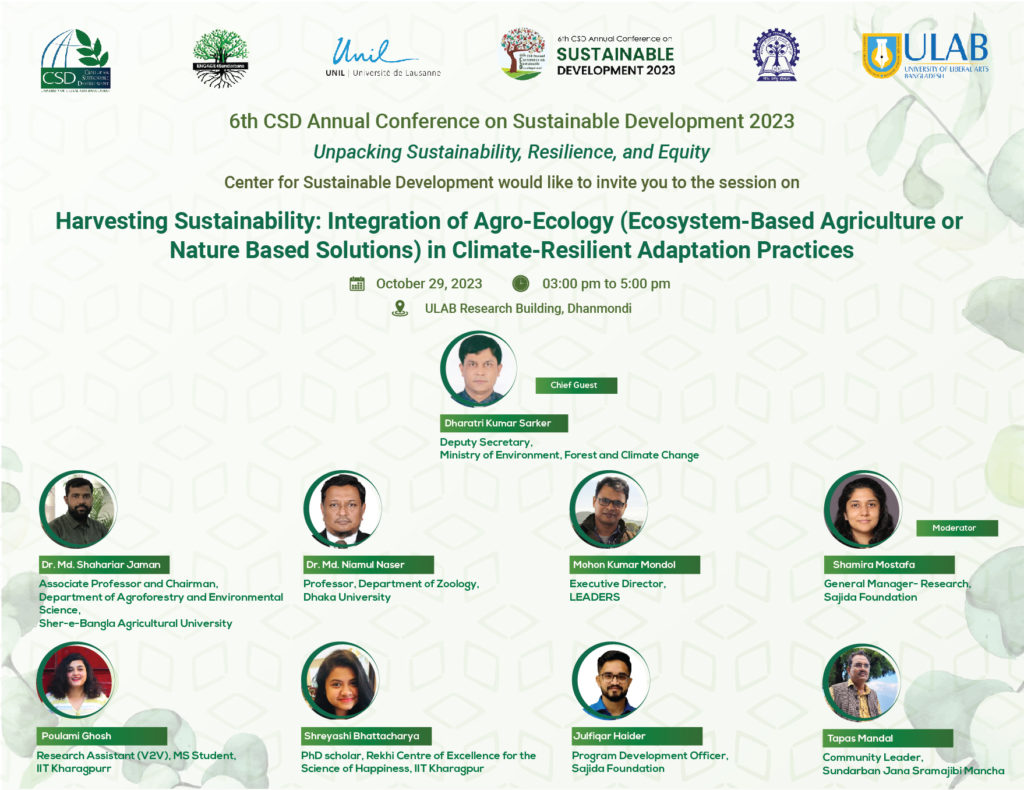ULAB Center for Sustainable Development Annual meeting
28 to 30 October 2023, ULAB Permanent Campus: https://csdannualconference.com/
Our team is fully involved in the organisation of the CSD annual conference
The urgency and complexity of the current sustainability crisis is a challenge for all. The changing climate of our current world poses challenges to practically every domain of human society, from food security to health well-being, and prosperity. Most pressing among these concerns is the need to manage and govern our natural resources in a way that promotes equitable outcomes, ensuring that the poorest and most marginalized groups, including women and minorities, can access the resources they need to reverse the entrenched exclusion that continues to make them the most vulnerable to a changing climate.
This interdisciplinary and transdisciplinary conference is organized by CSD-ULAB, and, like in the past five years, will bring together local and international experts from across the globe to have meaningful explorations of cross-sectoral and cross-boundary solutions, provide a platform for accelerating innovation, engage with both public and private actors, and foster an inclusive space for collaboration and transformation – within academia and beyond. The focus of this year’s conference is on a number of interconnecting issues – climate change, blue growth, equity, mental health and well-being, resilience and sustainable education.
We always believe that working in collaboration is the only way we can effectively address sustainability challenges and this year we are partnering with several of our local International Projects Partners- Engage, NOCRISES, V2V, and with local and international Partners – Sajida Foundation, University of Waterloo, BRAC University, ICCCAD and ZMT Leibniz Centre for Tropical Marine Research.
Our session on the 29th of October:

The GBM or Bengal river delta, with a population of 250 million relies predominantly on agriculture. In Bangladesh, agriculture accounts for 13% of the country’s GDP and employs 40% of the total labor force. Despite efforts, agricultural production systems remain mostly traditional and subsistence-based. The progress toward sustainable and diversified agriculture is crucial for the overall development of the country. However, Indian and Bangladesh coastal areas are increasingly exposed to climate variabilities, such as frequent flooding, erratic rainfall, droughts, and salinity intrusion which affects the agriculture sector. Climate change, coupled with unsustainable agricultural practices, like shrimp farming, threatens future agricultural production, natural resource sustainability, and the integrity and quality of ecosystems.
In coastal Bangladesh, where land is only centimetres above sea level, large swathes of agricultural land are becoming degraded, and crop yields are shrinking due to increased salinity. This is impacting the livelihoods of millions. Therefore, Ecosystem-based Adaptation, the ultimate solution, uses biodiversity and ecosystem services to help people adapt to climate change, restoring ecosystems, improving food production, and ensuring sustainable livelihoods for millions. Ecosystem-based agriculture/agroecology (EBA) not only has the potential to provide sustainable livelihoods for millions but also to protect ecosystems, prevent land degradation, restore degraded lands, and support biodiversity.
This session aims to critically reassess current ecosystem-based agriculture practices from both practitioners’ and academicians’ perspectives with two very specific objectives in mind; a) Challenges and opportunities of EBA adoption in Sundarbans delta b) EBA Knowledge mobilization for policy advocacy. By bridging practices and theories of ecosystem-based agriculture the proposed session will delve deep into the opportunities EBA offers in terms of livelihoods, ecosystem restoration, and biodiversity conservation, as well as the structural, logistical, policy, and governance challenges that EBA faces. Findings and learnings from this session will be compiled to develop a policy brief to share with stakeholders and policymakers.
